Benefit fraud: how a gang’s £50m scheme was uncovered
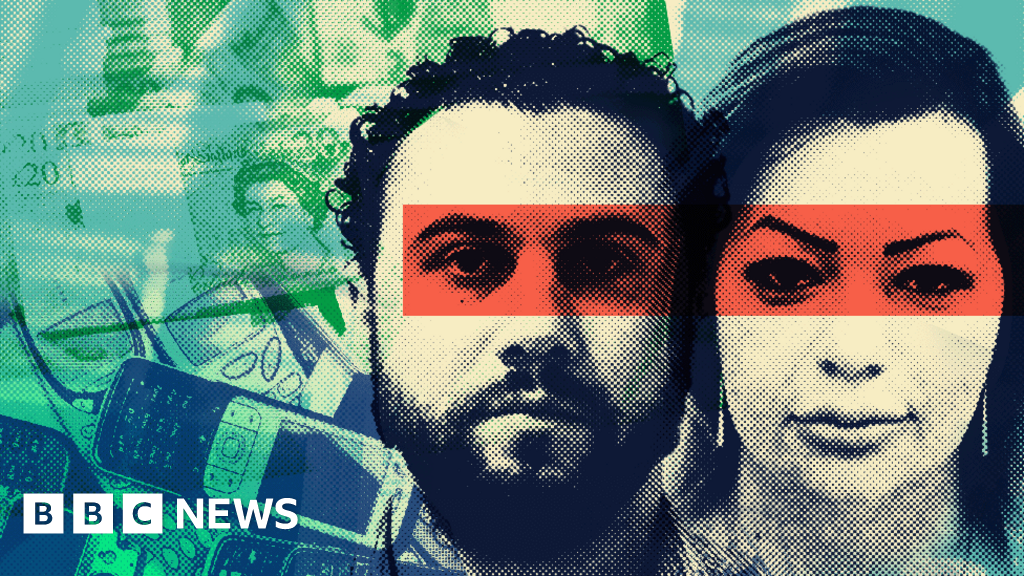
Michael Buchanan,Anna Michaux
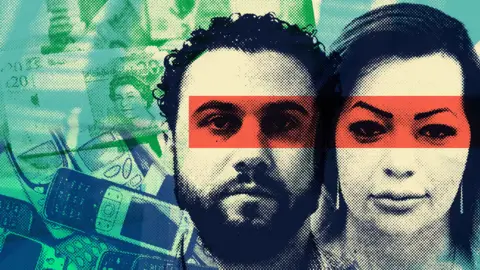 BBC
BBCAntonia Food was an unremarkable shop in north London. Outside was a display of fruit and vegetables; inside, a variety of groceries, chocolates and alcohol. Often standing behind the counter greeting customers was a bottle-blonde Bulgarian, recalled by neighbours mainly for her striking eyebrows.
But Galina Nikolova was no ordinary shop worker. She was one of the masterminds of the UK’s biggest ever benefit fraud. When police raided her property, they found £750,000 in cash.
“To seize that much money in one day is unheard of,” said Carolann Mongan, the benefits official who led the investigation into the gang. “It was under a bed, behind a fridge, hidden in suitcases. I’ve worked on some big cases, but nowhere near the scale of this.”
Nikolova’s arrest was the culmination of a two-year investigation into an organised gang by counter-fraud officials at the Department for Work and Pensions (DWP). Speaking exclusively to the BBC, the DWP investigation team and Crown Prosecution Service officials described this as the most complex case they have ever worked on.
The gang admitted £53.9m of fraudulent claims, and at Wood Green Crown Court on Thursday two of the gang members received what are thought to be the longest sentences ever passed down for benefit fraud.
Nikolova, 39, was found to be responsible for £25m in losses to the taxpayer and was sentenced to eight years’ imprisonment. Four other gang members were also sentenced to between three years and seven years in prison.
The fraud saw thousands of Bulgarians transported over to London, often by plane at the gang’s expense, to make claims for Universal Credit.
Their IDs would be used to start the claim and then the gang would bolster the application with fraudulent tenancy agreements, employment records, GP letters or evidence of children.
Investigators believe the initial benefit payment, or at least some of it, would go to the claimant but that the recurring monthly payments would be collected by the gang, who would often withdraw it in cash from hundreds of different bank accounts.
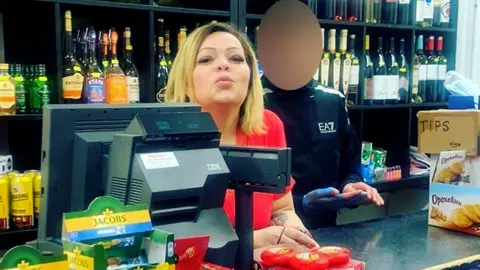
It is not known exactly who these bogus claimants were, but some are thought to have immediately returned home to Bulgaria.
Prosecutors said Galina Nikolova started making fraudulent claims for Universal Credit in October 2016 – before Brexit changed the rules on EU citizens claiming benefits. She was working alongside another Bulgarian, Gyunesh Ali.
Social media videos Ali posted promoting one of his companies, Deluxe Advisors, paint him to be an accounting expert though he previously described himself as a carpenter, in a listing at Companies House in 2015.
In a video posted in 2020, Ali said he had plans to open offices “in the big cities in England” and, writing in Bulgarian, offered to provide help to anyone with settled or pre-settled status in the UK under the post-Brexit immigration rules, and invited people to get in touch. By this time, he was stealing millions of pounds from the British taxpayer.
For reasons that remain unclear, Ali and Nikolova decided to end their business partnership in 2018. She formed a new company, G Translations and Advice Limited, in July 2018.
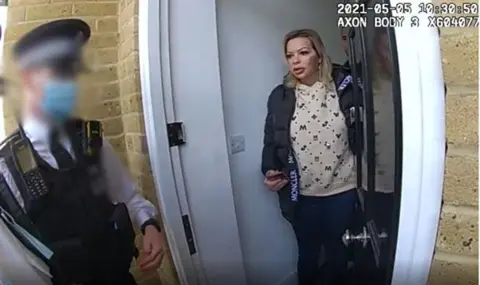 CPS
CPSAs well as taking with her one of Ali’s employees, Patritsia Paneva, another Bulgarian, she also took with her the skills she had learned from Ali on how to defraud the welfare system and began operating from a back room in Antonia Food.
“Ali was clearly the ringleader in the gang,” said Ben Reid, a specialist prosecutor in the Crown Prosecution Service’s Serious Economic, Organised and International directorate.
“Ali essentially taught the gang how to operate and then Nikolova branched into her own version. She replicated in large scale what Ali had been doing – she took his original ideas and expanded on them.”
The reason the fraud was detected, said Mr Reid, was because investigators were able to spot repeating patterns in the applications. “You’d have multiple claims going through one address, which is just not logical for a benefit claim; multiple claims all using one mobile phone number for communications.”
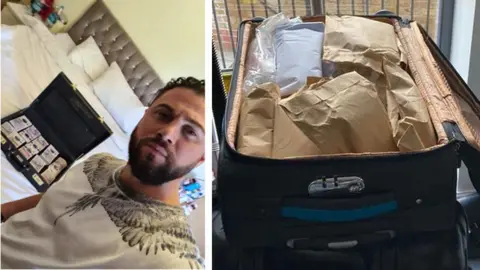 CPS
CPSWhile the fraudulent claims began in October 2016, the gang were able to take advantage in particular of a relaxation of the benefit rules during the pandemic.
Crucially, face-to-face checks for Universal Credit were stopped as the DWP tried to cope with both Covid restrictions and an extraordinary number of claims.
The number of people on the benefit almost doubled, to just under six million, in the four months between March and June 2020. Fraud also soared during this time; in the two years of the pandemic, 2020-2022, official figures show that £10.2bn was lost to fraud on Universal Credit.
In May 2021, officers from the Metropolitan Police alongside DWP investigators raided three businesses in the Wood Green and Stoke Newington areas of north London – including Antonia Food – as well as several residential addresses.
Over three floors at Deluxe Advisors – Ali’s company – investigators found an extraordinary quantity of evidence. There were computers, some open on the Universal Credit application page, filing cabinets full of claim packs, and folders containing records on benefit claims.
There were also several hundred low-tech mobile phones, all being charged, alongside thousands of SIM cards. On the back of most of the phones were the names and claim number of the applicants to which the phones referred.
For instance, two phones were used in 100 fraudulent claims as the numbers for bogus landlords.
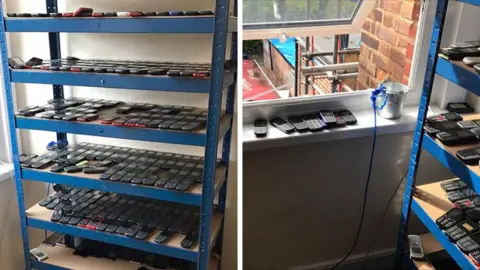 CPS
CPS“I’ve never seen anything like it,” said Jim MacIntyre, a DWP disclosure officer who attended the raid. “I’ve dealt with cases for a large number of years, organised fraud case. But this is 100 times bigger.”
They also found a voice-changing microphone, which investigators assumed was used to change the fraudster’s voice whenever a benefits official would call to check the details on a claim.
On the top floor they found a bucket attached to a rope which they suspect was used to move phones between floors in a hurry, by dropping it through a window, to allow accomplices to pose as claimants on calls.
When they examined the gang’s own smartphones and computers, they found spreadsheets, with exact details for thousands of claims.


“They basically had laid it all out on a plate for us,” recalls Karen Priest, a senior investigating officer with the DWP. “There was so much there. We expected to go in and find evidence, but not on the scale.”
The material from Deluxe Advisors was taken to Edmonton police station, where it was placed alongside evidence seized from the other raids.
A large haul of luxury items had been seized. Rows of expensive shoes – Moschino, Chanel, Alexander McQueen – were found, particularly at Nikolova’s property. Also taken were a Moncler jacket, Versace watch, Ugg boots, Dyson hairdryer, Ray-ban sunglasses and an Audi car.
 CPS
CPSThe group were released under investigation. Days later, Ali, the suspected leader, fled to Plovdiv, Bulgaria’s second city. An initial sense of annoyance among the investigators gave way to a determination to bring him back.
“He’d been in from the beginning, a key player,” said Lorraine Hallett, a senior investigator with the DWP. “It was also a matter of fairness [to the others]. And to get justice. He wasn’t any less involved.”
An extradition request was initially rejected by the Bulgarian courts, but a higher court overturned that decision and in February 2023, Ali was returned to the UK.
Another gang member, Tsvetka Todorova, also tried to flee but was arrested at Stansted Airport. Nikolova also appears to have had plans to leave; she was arrested for trying to get a new Bulgarian passport on a false basis, claiming she had lost her original one.
Having initially pleaded not guilty at various hearings over a 13-month period, from March 2023, the three women as well as Ali and another man, Stoyan Stoyanov, admitted benefit fraud.
Gyunesh Ali, 34, was sentenced to seven years and three months in prison. Stoyan Stoyanov, 28, was sentenced to four years and Tsvetka Todorova, 53, was sentenced to three years imprisonment.
Todorova was due to be released on licence on Thursday, because of the time she has already served in custody and under house arrest. She is liable to be deported back to Bulgaria.
Patritsia Paneva, 27, was sentenced to three years and two months, with the judge taking into account that she had been 19 when she was first recruited by Nikolova and had been initially paid £80 a day by the gang.
Analysts working on the scam calculated that the gang had claimed for about £100m in Universal Credit payments over the nearly five years they were operating.
The Crown Prosecution Service intend to pursue further legal action to recover as much as they can of the missing money, including in Bulgaria, where much of the proceeds of the UK’s biggest benefit fraud are thought to have gone.
Related
Why investing in women is a vital next step for…
Get Nadine White's Race Report newsletter for a fresh perspective on the week's newsGet our free newsletter from The Independent's Race CorrespondentGet our fre
Business secretary signals major shift on electric car policy to…
In a determined effort to retain Nissan’s manufacturing presence in Britain, Business Secretary Jonathan Reynolds has vowed to implement “substantial c
Joint Statement: Business Secretary and Fujitsu Services Ltd
Business and Trade Secretary Jonathan Reynolds today (Friday 7 March) met chiefs for Fujitsu in Tokyo to begin talks over the cost of redress for victims of th
UK foreign secretary backs multilateral defence funding for Europe
UK foreign secretary David Lammy has said that a new multilateral fund will be needed to secure Europe’s defence as he confirmed that Britain is “open to”














